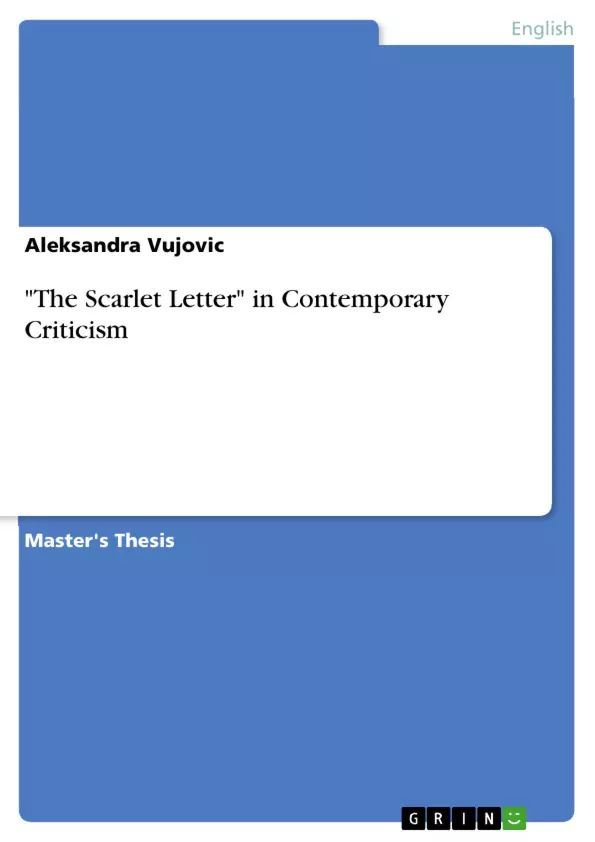This paper gives a brief overview of Hawthorne’s most important and famous work "The Scarlet Letter" from the point of view of five contemporary theories of criticism: Psychoanalytic Criticism, Reader-Response Criticism, Feminist Criticism, Deconstruction and The New Historicism.
"The Scarlet Letter" was first published in 1850, but its genesis can be found in tales and sketches Hawthorne wrote some years before he began to work on this novel. Being a Puritan descendent, in one of those sketches from 1845 he speculates about what life would be like for a young woman who would be condemned always to wear the letter A for having committed adultery. For Hawthorne this is a moral tale; the wild rose in the opening chapter points out the novel’s moral purpose: it is our duty to show to the world our true nature.
Table of Contents
- ABSTRACT
- APSTRAKT
- INTRODUCTION
- PSYCHOANALYTIC CRITICISM
- READER - RESPONSE CRITICISM
- FEMINIST CRITICISM.
- DECONSTRUCTION
- THE NEW HISTORICISM.
- CONCLUSION
- REFERENCES
Objectives and Key Themes
This paper offers a comprehensive analysis of Nathaniel Hawthorne's "The Scarlet Letter" from the perspectives of five prominent contemporary critical theories: Psychoanalytic Criticism, Reader-Response Criticism, Feminist Criticism, Deconstruction, and The New Historicism. The work delves into the novel's core themes, exploring the societal norms of the Puritan community and the implications of transgression, particularly in the context of adultery.
- The impact of Puritan societal norms on individual lives and choices.
- The consequences of adultery and societal punishment.
- The interplay between individual conscience and communal judgment.
- The exploration of gender roles and societal expectations in the Puritan era.
- The complexities of human relationships and the search for redemption.
Chapter Summaries
- Introduction: This chapter provides an overview of "The Scarlet Letter," introducing its historical context, main characters, and the societal backdrop of Puritan New England. It explores the novel's core themes and its significance in literary history.
- Psychoanalytic Criticism: This chapter explores the work through the lens of psychoanalytic criticism, analyzing the characters' subconscious desires, motivations, and conflicts. It examines the role of repression, guilt, and the unconscious in shaping their actions and relationships.
- Reader-Response Criticism: This chapter examines the novel through the lens of reader-response criticism, exploring how different readers interpret the text based on their own experiences and perspectives. It considers the subjective nature of literary interpretation and the impact of reader engagement on meaning-making.
- Feminist Criticism: This chapter analyzes "The Scarlet Letter" from a feminist perspective, exploring the portrayal of female characters and the societal expectations placed upon them. It examines the themes of gender inequality, power dynamics, and the impact of patriarchal structures on women's lives.
- Deconstruction: This chapter examines the text through the lens of deconstruction, challenging the stability of meaning and exposing the inherent contradictions and ambiguities within the narrative. It explores the instability of language, the impossibility of absolute meaning, and the subversive nature of literary interpretation.
Keywords
The central focus of this paper lies in examining Hawthorne's "The Scarlet Letter" through the lens of contemporary critical theories, particularly Psychoanalytic Criticism, Reader-Response Criticism, Feminist Criticism, Deconstruction, and The New Historicism. Key themes explored within the text include adultery, sin, guilt, societal punishment, gender roles, Puritanism, and individual conscience. The analysis centers around the characters of Hester Prynne, Arthur Dimmesdale, and Roger Chillingworth, along with their complex relationships and the societal pressures they face.
- Arbeit zitieren
- Aleksandra Vujovic (Autor:in), 2009, "The Scarlet Letter" in Contemporary Criticism, München, GRIN Verlag, https://www.grin.com/document/1271882



